Confused about what you can and can’t recycle? We’ve got you covered with our ultimate guide to recycling.
We are all recycling more and becoming increasingly savvy when it comes to reducing our single-use plastic use thanks to programmes like David Attenborough’s Blue Planet II and the BBC’s War On Plastic, not to mention the work of activists like Greta Thunberg.
But recycling can be confusing. What can and can’t go in your recycling bin? Can you recycle toothpaste tubes? What about plastic meat trays? Let’s clear up the confusion around recycling once and for all with your definitive list.
What you can recycle from home:
- Glass bottles and jars (rinsed)
- Paper including newspapers, magazines, catalogues, telephone directories, Yellow Pages, envelopes (with or without windows), junk mail, office paper, greeting cards, wrapping papers (not metallic/foil), books
- Shredded paper (in clear bags please)
- Cardboard (flattened) including food and non-food packaging card, and non-waxed cardboard
- Food tins and drink cans (rinsed)
- Aluminium foil and trays (clean)
- Aerosol cans (empty) but not paint, fertilizer or weed killer cans or sprays
- Plastic bottles (rinsed and squashed with lids put back on)
- Plastic bleach and cleaning bottles
- Plastic pots, tubs and trays including yoghurt pots, ice cream tubs, margarine containers and food trays (but no black plastic please)
- Plastic bags and sacks (not black ones)
- Plastic film including magazine wrappers and tops of food trays
- Plastic packaging including those that contained batteries or toys
- Toothpaste tubes
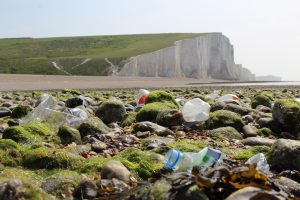
Reducing, reusing and recycling helps keep plastic out of the environment.
Why should I rinse and clean items?
All recycling must be free from food and left over contents before placing them in the recycling bin. This helps keep the quality of materials before being collected and ensures it can be recycled. Recycling facilities rely on the material they receive being clean, dry and loose. It doesn’t have to be perfect – a quick rinse in your old washing up water will do!
What you can’t recycle from home:
- Textiles such as clothes – please donate these to charity or take them to your Household Waste Recycling Site (you’ll need to book a visit to the tip from 24 November 2025)
- Food waste (if in Lewes please use your food waste recycling bin)
- Nappies and other sanitary waste
- Food and drink cartons such as Tetra Pak
- Batteries*
- Refuse (if your bin is full, you can take any extra refuse to your Household Waste Recycling Site – remember to book your visit)
- Black plastic bags and sacks
- Black plastic trays
- Wood
- Garden waste – please check your local council’s website for garden waste collections
- Polystyrene
- Bubble wrap
- Hard plastics such as toys and plant pots
- CDs, DVDs and their cases
- Foil-lined plastic pouches and bags like crisp packets
- Medical blister packs
- Cling-film
- Pyrex or ovenproof glassware and drinking glasses
- Crockery
- Window panes, mirrors, light bulbs
- Tyres
- Scrap metal
- Wet paper and card
- Sand and building materials
- Electrical equipment*
- Bottles, cans or aerosols that have contained toxic or hazardous chemical
- Oil or pesticide containers
It’s worth double checking that none of these are in your recycling bin as it can lead to whole recycling loads to be rejected!
*Batteries and everything with a plug, battery or cable can be recycled if you live in Wealden, Rother or Hastings areas. Pop your items in a carrier bag and place them on top of either your waste bin or recycling bin on collection day. Always place batteries in a separate bag. If you live in the Lewes or Eastbourne area please take batteries to your local household waste recycling site – see book a visit to the tip. Many supermarkets also collect them.
Lewes District Council has a separate food waste recycling programme. If you live in this area, please check their web page about Lewes District Council’s food waste recycling to find out more.
You can find out more about composting your food leftovers on the Royal Horticultural Society’s composting pages.
Not enough room in your bin?
Bottles should be squashed (and lid kept on) and large pieces of cardboard should be folded. This will mean you have more room in your bin.
If you have more recycling than can fit in your bin, you can place extra in a clear bag next to your recycling bin. Or, a much better solution would be to reduce the amount of single-use plastic and packaging you buy.
Check out: How to ban single-use plastics from your home.
If your waste bin is full, you can take any extra refuse to one of our household waste recycling sites – see book a visit to the tip.
Is recycling the right thing to do?
The best thing for the environment is to reduce the amount that we buy and use in the first place. Is there a local refill shop near where you live or work that you can visit to refill on household items? Can you switch from bottled shampoo to shampoo bars? Can you meal prep on Sunday night and avoid purchasing lunchtime meal deals that often come in plastic packaging?
Even simple changes such as avoiding plastic bottles and purchasing their glass jar counterparts means you have a reusable item once you’ve finished the contents. Which brings us to…
If you can’t reduce, you should look to reuse. Can that glass bottle be used as a candle holder? Can that plastic bottle be adapted to grow kitchen herbs in? Why not paint that cardboard shoe box and use it for storage? Donating and re-gifting items are also great ways to reuse. See our craft-based idea to Ditch the plastic bags and make your own!
If you absolutely can’t reduce or reuse, then recycle. However, it is worth mentioning that we can’t recycle our way out of this crisis.
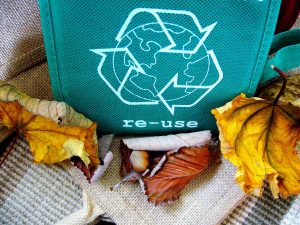
Who looks after what?
Your district or borough council looks after collecting your recycling from the kerbside. East Sussex County Council is responsible for the disposal, recovery and recycling of this material as well as that from our 10 Household Waste Recycling Sites.
You can find out more about what you can and can’t recycle by checking with your local district or borough council.
You can also check out the TerraCycle website which shows drop off points that collect and recycle materials that are not typically collected at the kerbside. The site can help you recycle everything from crisp packets, pet food pouches, toothbrush heads to pens and coffee pods.
Article updated November 2025.
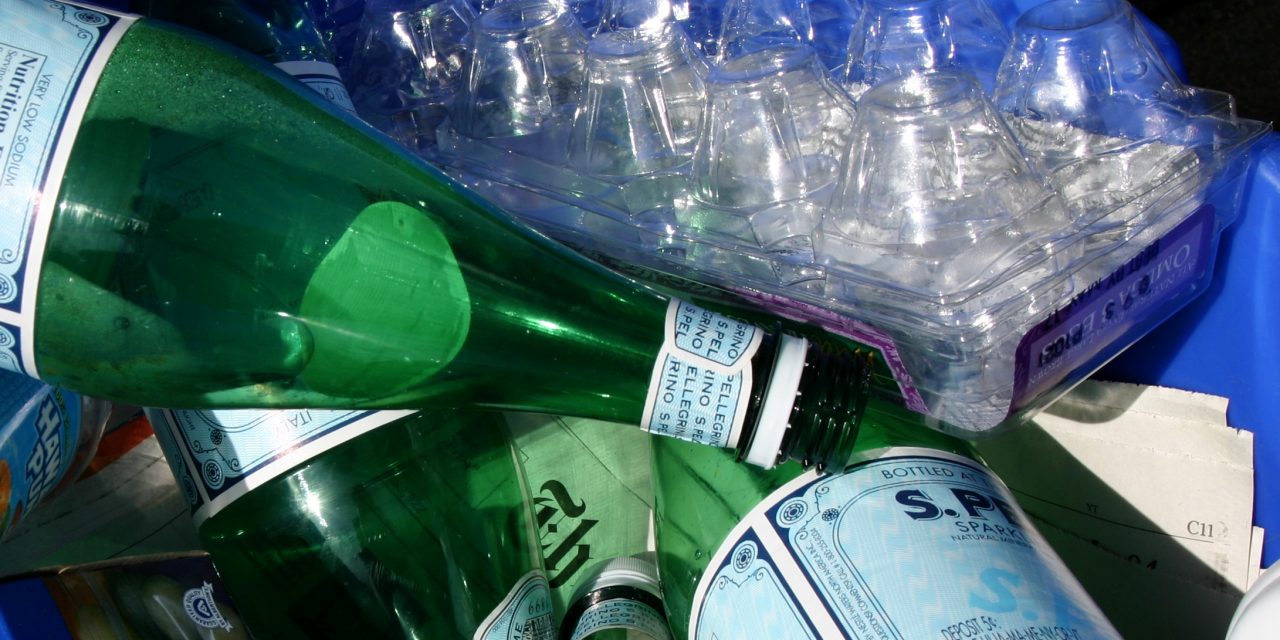
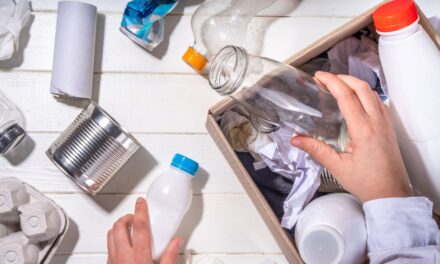

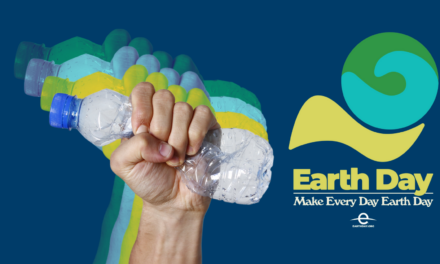
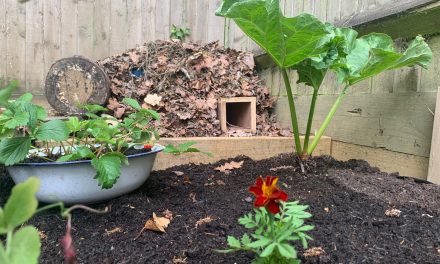
When did Tetra Paks cease to be re-cycled material?
Hi Fred, thanks for your question.
With the recycling reprocessing industry tightening its quality standards, cartons/Tetra Pak are now treated as contaminant. Even where recycling of cartons occurs it is often costly and inefficient. In general, cartons are comprised of 6 layers of material (including 2 types of plastic) which need to be separated. The paperboard fibres are recycled into pulp and used to make household products such as paper towels and toilet paper but usually the remaining plastic and aluminium compound residue – called PolyAl – is often incinerated at energy recovery facilities.
There is currently just one facility in the UK (Sonoco/ACE UK near Halifax) that is specifically designed to process cartons for recycling. Until such time that more efficient and economic methods of recycling cartons are available, we’re keen to preserve the quality of the recycling that is being collected from residents.
Tetra Pak/ cartons can be placed in your waste bin. The good news is that waste that can’t be recycled, reused or composted is mostly sent to the Energy from Waste facility at Newhaven and converted into electrical energy – enough to supply 25,000 homes.
Are metal, tomato puree tubes recyclable?
And after years of separating our glass from the rest of our recycling it is now just going into the main bin, but we didn’t know this, a neighbour told us when they noticed our glass was left behind! Whyis it we weren’t informed of these changes, until reading this report today, I have been recycling medication blister packs and tetrapaks, so unconsciously contaminating my efforts!
Hi Mandy, these mix plastic with aluminium and glue. Unfortunately, we can’t recycle these. I’ve passed your feedback back to the Waste Team about communication of the changes. Best wishes, Laura
I’ve read online that Tetrapak cartons can be recycled at an address in North Street, Lewes. Is that correct? And… where can I recycle batteries and ink cartridges in Lewes?
Hi John, thanks for your questions.
Carton recycling – yes, there is a container for cartons at the North Street bring site (mini recycling point) in Lewes.
Ink cartridges – these can be taken to any household waste recycling site but suppliers also have takeback schemes and some charities want them too!
Batteries – lots of supermarkets and shops have containers where they are selling new batteries or, failing that, they can be taken to a household waste site.
You can find more recycling locations using this Recycle Now feature: https://www.recyclenow.com/local-recycling
Best wishes, Laura
Thanks Laura,
That’s good advice about Tetrapaks and the mini recycling point in North Street. I’m not quite sure what you mean about batteries being sold at supermarkets and some shops – I want to get rid of batteries, not buy them. I’ll look out for a charity that might want ink cartridges, as I don’t have a car and so cannot easily get to recycling sites, although I’ll look at the link you sent re recycling locations. Cheers.
Hi Laura,
I looked for the mini recycling point in North Street/Brook Street and couldn’t find it. Is it still there? And if so, is it signposted?
No worries re carton recycling point. I found it today, at Brook Street Car Park. There is also a shoes (in bags) recycling point there too.
If it`s not organic it goes in the recycling sack, it`s not the public`s job to work out what is what and what is not suitable, this is why we pay council tax!
It`s up to local and national government to put pressure on manufacturers to make ALL packaging recyclable.
Blister packs now can’t be recycled? Plastic bottles with lids on? Recently we were told lids off! And what about black meat trays?
Hi Fiona, when the new waste and recycling contract started in July some changes were made to the materials that could be recycled. This included no longer be able to recycle medical blister packs and Tetra Paks which are difficult to recycle. It also saw a change to how we recycle plastic bottles. We now ask you to rinse and squash the bottle before placing the cap back on. This means more room in your recycling bin and the bottle is easier to process at the recycling facility as it does not roll about. Black meat trays can’t be recycled as the machines can’t easily spot them as plastic when they are automatically sorting through loads. I’ve amended the list to reflect this. The good news is that waste that can’t be recycled, reused or composted is mostly sent to the Energy from Waste facility at Newhaven and converted into electrical energy – enough to supply 25,000 homes. Hope this helps.
Hello Laura
Recycling plastic bottles. I always jump on my empty large milk bottles and other drinks bottles but due to the jumping on them the necks get distorted and the lids no longer fit. Does it matter that they do not have lids on?
Hi Michael, a hand squeeze is fine! Lids on is preferable as then the bottle will stay smaller and move through the recycling plant easier. An alternative is to pop the lid into the bottle but our preference is lids on. Hope that helps!
So you change what can and can’t be recycled but don’t bother to tell us? We are still using the info that came at the start of the year with the collection calendar which it appears is now out of date. So has everything we’ve been recycling for the past few months been wasted because it’s wrong? Only found out about the glass and tetrapaks by accident not because we were told officially.
Hi Carolyn, the changes occurred when our new waste and recycling contract started in July. The changes are that glass no longer needs to be separated, Tetra Paks and medical blister packs should no longer be placed in recycling bins and plastic bottles should be squashed and lids placed back on. The changes were communicated by tags on everyone’s recycling bins, social media, local media and council newsletters. I’ve passed your feedback back to the Waste Team. Many thanks, Laura
Hi Laura.
Carolyn makes a good point. The only official communication I have seen was on Facebook and was just about one issue, electrical goods. I do understand that recycling rules change, but ESCC needs to have a far better way of communicating this . The bin tags are a great idea, cheap to make and distribute, but I have never seen one. Also, an A4 printable guide on this web site for each bin would be helpful. Here in Hastings that would be 3, black, green and brown A4 guides.
Thanks Andrew
Hi Andrew, thank you for your feedback. The bin tags were back in July 2019 when the contractor changed, so a little while ago now. We work closely with local district and borough councils (who collect your recycling) to try and communicate any changes with residents and we do take on your comments. The latest changes were to the collection of electrical items, so we’re glad to hear that you’ve seen the social media posts about this. You can find information about recycling on the East Sussex County Council website and also your local district and borough website. In November 2020 we sent a printed guide to all households in East Sussex with recycling information, did you receive a copy? Best wishes, Laura
Hi,
Please can you tell me what happens to our recycling? Where does it get sent to be processed?
I am dismayed by all the reports of rubbish sent to poorer countries to be left in huge stacks and eventually burnt.
I would like to be reassured that East Sussex is recycling responsibly and then I can continue to fill my recycling bin with a clear conscience.
Thank you
Hi Emelye, thank you for your question and we really appreciate your concerns.
We work with two extremely experienced Waste Management Companies – Viridor and Veolia – who handle the recycling material for the District & Boroughs across the county (including Brighton & Hove).
Viridor and Veolia operate in global markets selling quality recyclate to commercial third parties. The Environment Agency is the regulating body and closely monitors shipments of material to other countries. Viridor’s and Veolia’s relative size within the resource market helps ensure that they can procure secure, stable contracts for the provision of high quality recyclate to the marketplace.
This means that whilst the majority of recycling materials can be reprocessed within the UK, some material does go abroad – including to Asia – because it makes sound economic and environmental sense and only through the use and expertise of reputable companies.
We are assured that our contractors comply with UK waste shipment regulations and we are able to evidence how we meet our statutory and contractual obligations regarding the material that is managed by the Viridor and Veolia contracts.
By working with experienced, specialist waste companies such Viridor and Veolia, we are confident that it has in place a robust system of traceability with regard to materials deposited by residents for recycling either at the kerbside, bring sites or via Household Waste Sites (tips). Their relative size within the resource market helps ensure that they can procure secure, stable contracts for the provision of high quality recyclate to the marketplace.
We will be sharing more information on where recycling goes and what happens to it soon.
When you say that medical blister packs cannot be recycled, do you mean the packs that pills, like vitamin pills for instance, come in?
Hi Barbara, that’s correct. Thanks, Laura
Yes please, I look froward to hearing exactly where these items end up.
At least that way we can choose to recycle things that are being ethically dealt with.
I think I would feel happier sending the other items to be incinerated than think they will end up causing environmental and health problems in a different country..
Out of sight should not be out of mind.
We’re on it!
Hello Laura
I was astonished to find a reversal of the way in which shredded paper is to be put out IN the wheelie bin. Hitherto (in the era of the Black Box) it was to be bagged. Then in the new era of the Wheelie Bin it was simply tipped in with everything else. (I found this method totally against the grain) Now this method has been revised: “Put shredded paper in a clear plastic bag and put it in the bin”. This makes much more sense. I am continually getting printed bags (not quite ‘clear’ as such) from Charities to hold clothing etc. Will these bags (turned in-side-out) be acceptable for shredded paper since they’re not ‘clear’?
Hi Michael, clear bags are asked for so that the shredded paper isn’t mistaken for waste. Best wishes, Laura
Some plastic bottles, such as some shampoos, have tops that can’t be removed, so can’t be rinsed out. Do we put these in our refuse bins?
Hi Judith, please still recycle these bottles after squeezing as much as you can out of them! The lids can be removed later in the recycling process. Thanks, Laura
Hi Laura,
I would like to re-iterate that as far as I am aware, there has not been any information sent out to inform people of the change in recycling after the new contract started.
A list of what and what should not go into the recycling bin MUST be sent to EVERY household.
Hi Brian, the design for this has just been finalised and it will be sent out to all households this autumn. Thanks, Phie
Does plastic bags include bread bags? Many say ‘ not yet recycled’ or ‘At larger store – not at kerbside’. Please can you clarify?
Hi Cally, please place these in your recycling bin for now. Best wishes, Laura
Hi,
Is it not possible to advise which types of plastic CAN be included in our recycling by referring to the numbers within the recycling logo on the item? You’re never going to come up with a comprehensive list of what items can be recycled (Eg the plastic tray at the bottom of a box of chocolates isn’t listed), but if you just said that anything with a 1, 3 or 4 (for example) is OK, then we could just check for ourselves.
Hi Mark,
A very good question.
It’s not just the plastic code that determines whether that plastic can recycled in East Sussex. The shape and size of items is also important. For example, you could have two items made from the same polymer but of which only one is recyclable via kerbside collections.
So we tend to talk about particular ‘items’. We also find that people tend to understand items types over the resin number a bit better. So for plastic – we talk about ‘pots, tubs and trays’ and ‘plastic bottles’ etc.
While using the resin number is a good guide it’s still not 100% foolproof and potentially more confusing for people to remember. Although this is something we’ll keep under review.
Thanks for your comment!
Best wishes, Laura
Do kitchen roll and paper tissues count as paper?
Hi Stuart, these materials can be recycled but only if they are unused. Best wishes, Laura
Hello
I have 3 quick questions:
1. What do we do with the metal tops of glass bottles?
2. I have a lot of small, silver foil based items, e.g. from dairylea triangles, the inside wrapping of cardboard wrapped chocolate. Is it Ok to put them into recycling as they are or to put them n a bag together.
3. After reusing paper we end up with small bits (that are not shredded), how small can bits of paper be to recycle them?
Thank you.
Hi Caroline, apologies for the delay in response.
1) Keep tops on please. This helps the tops gets recycled and also limits the glass breakage so we lose less of the small broken bits to ‘fines’ which don’t get recycled.
2) Clean foil can be recycled. Please check it is foil (rather than plastic) by doing the ‘scrunch test’ – if its scrunches up nicely, gather up the small bits and scrunch it all together and then pop it in the recycling container.
3) Some small bits of paper do get lost in recycling but some will still get through – its difficult to say how small is too small as it can depend on factors such as how fast the Recovery facility is operating etc. Please continue to place them in the recycling container. The worse case is they will go for energy-from-waste which is what would happen if they went in the black bag bin.
Best wishes, Laura
Hi – I am confused how to put the recylcing in a BAG?! I thought bags were not recylclable i found it more convenient and hygenic to put everyitnhg in black bin liner then in recycling – i always did this and my recycling was recently refused – so does it all have to be loose? Thats bound to give off smells and i’m really small which makes tipping my whole indoor bin into wheelie a challange!
Hi Emily, all recycling should be clean, dry and loose. We ask that you remove left over food by giving items a quick rinse before putting them in your recycling bin. We also ask that you don’t put items in a refuse sack, as it can be mistaken for waste. Hope this helps.
Hi,
We have a lot of old unusable electrical cords, phones, etc. Please will you advise if we can put these in a bag on top of our trash on trash day? Many thanks,
Lara
Hi Lara, If you live in the Rother, Wealden or Hastings areas then yes! Simply place your items in a plastic bag on top of either bin on collection day. Please keep batteries in a separate bag. You can find more information about the collection scheme here: https://your.eastsussex.gov.uk/2020/11/27/recycle-your-old-electricals-from-home/ Best wishes, Laura
Dissapointed to note that the one location in Lewes that we could recycle Tetrapaks and similar is now closing – large notice attached 17/09/21. Brook Street Car Park adsvising of removal. This was always well used and frequently full to overflowing (not helped by some users not collapsing cartons).
Are there any plans for a replacement site that will take Tetrapaks in Lewes Town Centre ? I do not have a car, like many others no doubt, so it needs to be accessible by pedestrians.
It does seem such a waste to put these packs in household waste. I am aware that they need special treatment at a small number of recyclers.
Hi Peter, sorry to hear this. It’s Lewes District Council’s decision to remove the container. However, the team here at the county council is currently working with partners to find an alternative solution. Best wishes, Laura
What can i do with endless plastic flower pots i accumulate? I heard they can be recycled if they are not black.
Hi John, plastic flower pots can be taken to any household waste recycling site (‘tip’). Due to the type of plastic they are, they can’t be recycled from the kerbside.